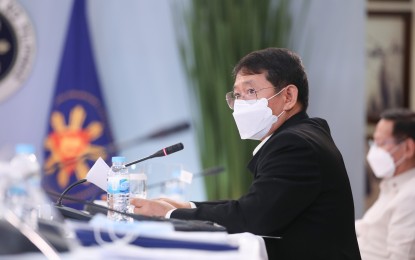[5.26] PH 주권의 WPS 행위에 부표 배치, Año는 말합니다
컨텐츠 정보
- 18,471 조회
본문
MANILA – 국가안보보좌관(NSA) "Eduardo Año"는 서필리핀해(WPS)에 항법 부표를 배치하기로 한 국가의 결정은 주권을 주장하는 행위이며 안전한 항행을 보장하기 위한 국제적 의무의 일부라고 말했습니다.
"WPS에 항행 부표를 배치하는 행위는 주권 국가의 행위이며 국제법상 국가의 의무에 따른 것입니다. 필리핀은 해양 국가로서 항행 안전 유지를 우선시하여 Año는 목요일 늦게 기자들에게 전달된 성명에서 말했습니다.
국가안전보장회의 사무총장이기도 한 "Año"는 항행 안전 보조 장치를 제공하지 않으면 해양 사고, 인명 손실 및 환경 피해를 초래할 수 있다고 말했습니다.
"우리는 안전하고 효율적인 항해가 국제 무역과 상업에 매우 중요하며 이에 대한 모든 혼란은 광범위한 결과를 초래할 수 있음을 강조하고 싶습니다. 게다가 우리의 해상 국경은 해적, 밀수, 테러와 같은 위협에 취약합니다. 따라서, 항해 안전을 유지하는 것은 이러한 위협으로부터 국가를 보호하는 데 매우 중요합니다."라고 그는 말했습니다.
"Año"는 또한 필리핀 해안 경비대(PCG)가 작년부터 WPS에 항법 부표를 설치하고 있다고 언급했습니다.
그리고 책임감 있는 해안 국가로서 그는 필리핀이 자국 해역에서 선박의 안전한 통행을 지원하는 이러한 항법 보조 장치를 설치하고 유지하겠다는 국제법에 따른 약속을 이행하고 있다고 말했습니다.
"Año"는 1년 넘게 Lawak, Likas, Parola 및 Pag-asa의 물 근처에 5개의 부표가 떠 있다고 덧붙였습니다.
"지난주 PCG 선박 4척과 수산수산자원국 선박 1척이 필리핀 배타적 경제 수역(EEZ)에 5개의 기본 표시 부표를 설치했습니다. 이 얕은 지역"이라고 말했다.
"Año"는 필리핀 국기가 있는 부표의 설치는 EEZ에 대한 국가의 주권과 관할권을 더 의미한다고 강조했습니다. 그는 필리핀 국기로 경계를 표시하는 것은 해양 자격과 자원을 보호하려는 국가의 확고한 결의를 상징한다고 덧붙였습니다.
Año는 "게다가 연안국이 EEZ를 관리할 자격이 있음을 인정하는 국제법, 특히 유엔 해양법 협약을 준수한다는 점을 강조합니다."라고 지적했습니다.
그는 또한 부표 설치가 이 지역의 평화, 안정, 협력 및 법치주의를 촉진하려는 필리핀의 약속을 강화했다고 강조했습니다.
"무차별적인 힘으로 하는 것이 아니라 국제법과 국내법을 뒷받침하는 심의적 조치로 이루어집니다. 결국 항행 보조 장치를 설치하고 유지하는 것은 우리 선박뿐만 아니라 주변 국가에도 이익이 됩니다. 모두의 이익"이라고 말했다. (PNA)
This is the Original Article from PNA NEWS
[5.26] Buoy deployment in WPS act of PH sovereignty, says Año
MANILA – National Security Adviser (NSA) ""Eduardo Año" said the country's decision to place navigational buoys in the West Philippines Sea (WPS) is an act asserting its sovereignty and part of its international obligation to ensure safe navigation.
"The act of placing navigational buoys in the WPS is an act of a sovereign nation and is pursuant to the country’s obligations under international law. As a maritime nation, it is imperative that the Philippines prioritize the maintenance of navigational safety to ensure the protection of our waters and the people who rely on them," "Año" said in a statement forwarded to reporters late Thursday.
"Año," who is also the National Security Council director general, said neglecting to provide navigational safety aids could result in maritime accidents, loss of life and damage to the environment.
"We wish to stress that safe and efficient navigation is critical to international trade and commerce, and any disruption to this can have far-reaching consequences. Besides, our maritime borders are vulnerable to threats such as piracy, smuggling, and terrorism. Thus, maintaining navigational safety is critical to safeguarding the nation against these threats," he said.
"Año" also noted that the Philippine Coast Guard (PCG) has been installing navigational buoys in the WPS since last year.
And as a responsible coastal state, he said the Philippines is just fulfilling its commitment under international law to install and maintain these aids to navigation that assist vessels in safe passage in the country's waters.
"Año" added that five buoys have been floating in the vicinity waters of Lawak, Likas, Parola and Pag-asa for over a year now.
"Last week, four PCG ships and one Bureau of Fisheries and Aquatic Resources vessel installed five cardinal mark buoys in the Philippines’ Exclusive Economic Zone (EEZ). These cardinal buoys will indicate the direction of safe waters to prevent passing ships from running aground in these shallow areas," he said.
"Año" stressed that installation of buoys with the Philippine flag further signifies the country’s sovereign rights and jurisdiction over its EEZ. He added that marking the boundaries with the Philippine national flag signals the country's unwavering resolve to safeguard its maritime entitlements and resources.
"Furthermore, it underscores our adherence to international statutes, specifically the United Nations Convention on the Law of the Sea, which acknowledges coastal states' entitlement to manage their EEZs," Año pointed out.
He also stressed that the installation of the buoys reinforces the Philippines' commitment to promoting peace, stability, cooperation and the rule of law in the region.
"It is not done with brute force but with deliberative action buttressed by international and domestic laws. After all, installing and maintaining navigational aids benefits not only our vessels, but also those of neighboring countries -- promoting safe and efficient maritime trade and commerce for the benefit of all," he said. (PNA)
관련자료
-
이전
-
다음


